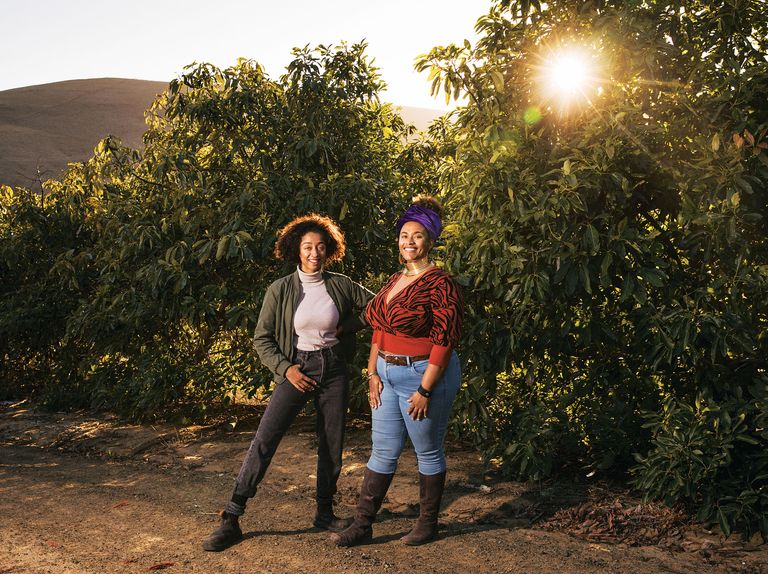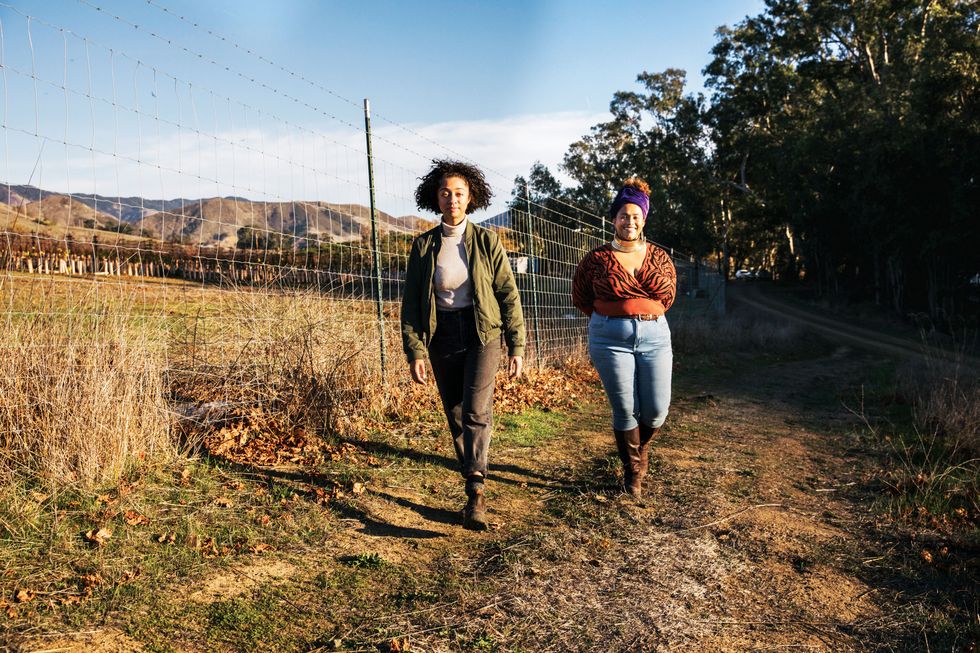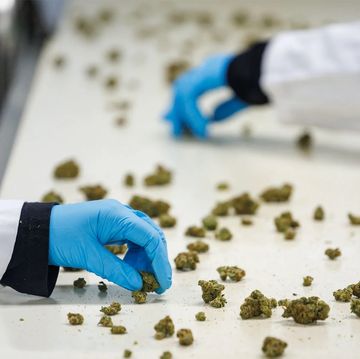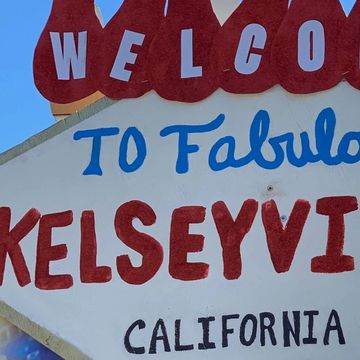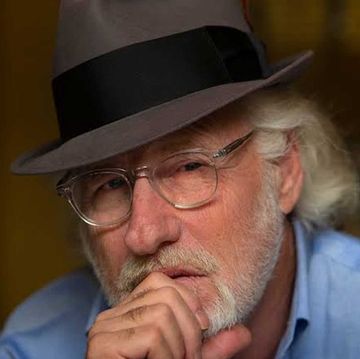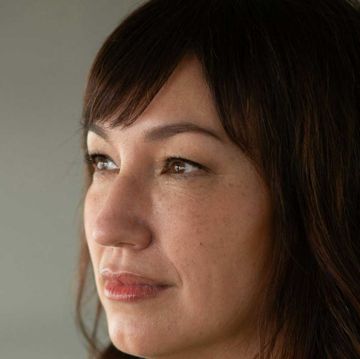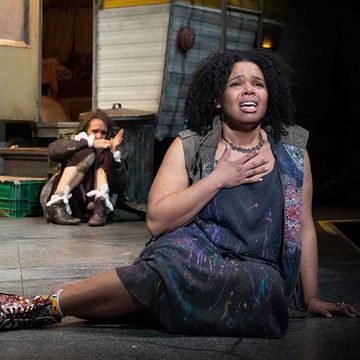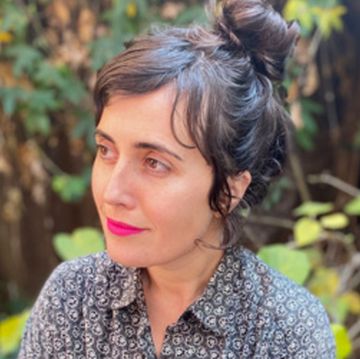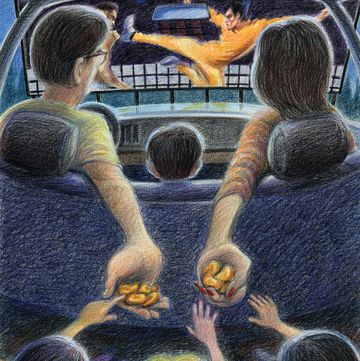We were all in quarantine, hiding from an airborne virus that attacks the lungs, but that wasn’t the reason George Floyd couldn’t breathe. No, there was a police officer’s knee on Floyd’s neck, out in the street, all of us watching and left guessing which breath was his last. “Mama. I’m through,” he cried. We all heard him, every Black matriarch and woman, dead or alive. It reached Simonne Mitchelson in the rolling hills of Arroyo Grande. She watched the video once—that was all she could stomach. She remembers being in her living room, shaking uncontrollably with rage. When you are a Black woman, you know what happens when you hear a cry like that. The way it sinks into your bones and everything aches. Everything had been aching.
Mitchelson was 27 years old, a petite but long woman with olive skin, hazel eyes, and wavy brown curls that bounced off her cheekbones. She was born in Durban, South Africa, but her family moved to Michigan before she could ever remember her birthplace. At 17, her parents sent her to live with an aunt in Auckland, New Zealand, and study physical therapy, just like her mom. But the city was buzzing then, its team having won the Rugby World Cup on home ground, and Mitchelson was swept up by the thrill of waiting tables and slinging Barossa shiraz.
“I really had no idea what hospitality was,” says Mitchelson. “My family didn’t have that much expendable income, so this was my first real exposure to the restaurant industry and to wine at all.” The bartenders laughed at her for not knowing what a champagne flute was, but she liked learning about wine and went to its source. For her first harvest, she’d take a 40-minute ferry every morning to Waiheke Island, crush grapes all day, and be back home in time for dinner service.
The grapes told her where to go. For a few years, she lived a cellar rat’s life, hopping hemispheres as the harvests alternated, as young winemakers in training liked to do. Her third harvest, she met her boyfriend and followed him to California’s Central Coast, where he’d found a winemaker gig in Paso Robles. She started managing a small family winery in Santa Barbara’s Sta. Rita Hills. They have lived in San Luis Obispo County for two years now, but Mitchelson thinks a part of herself will always feel like an outsider.
This article appears in the Spring 2021 issue of Alta Journal.
SUBSCRIBE
Reveling in its elite stature and protective of its traditions, American winemaking seemed like one of the last industries to hold itself accountable for its role in upholding structural racism.
Yet mere days after Floyd’s murder, when people decided whether to post black squares on their Instagram feeds to publicly signal solidarity with the Black Lives Matter movement, Mitchelson tuned in to Instagram Live and heard a clarion call for action. Pointing her finger at the camera, Julia Coney, a Black wine writer who splits her time between Houston and Washington, D.C., said, “The wine industry, shame on you. Shame, shame, shame on what you could have done today.” The tone of her voice was ominous. “I hope you get no rest,” she continued. “The three Black people that died in the last 30 days at the hands of the police, they don’t get any rest.” By morning, Coney had founded an organization to lift up Black wine professionals.
Mitchelson soon reached out to the only other Black person she knew on the Central Coast who worked in wine. Justin Trabue had moved from D.C. to attend Cal Poly San Luis Obispo. Now 25, she worked as an assistant winemaker to one of Santa Barbara County’s female trailblazers and managed a tasting room in Paso Robles. Mitchelson and Trabue had met a few months before; both were far from home, both were in interracial relationships—their white partners sympathetic but unable to grasp what Floyd had set off in their Black bodies. They escaped for a few hours to Pismo Beach, the gusts of wind that day sprinkling sand into their tacos as they poured out everything, even intimate things, because the world was different. Everything was cracked open.
An Open Letter
When I met Mitchelson and Trabue in person, the two of them were like yin and yang, bantering lively and easily. Us, three brown girls together in downtown SLO, the white people flocked to us like fruit flies over fermenting grapes. A woman approached us in an outdoor plaza and told us how picturesque we looked sitting there chatting in the sun. A professor asked us if we needed directions as we crossed paths in an empty university hallway. We wandered into a plant nursery, and a woman, recognizing the winery name on Trabue’s jacket, told her how good of a winery it was. “Yes, it is. Come visit me there,” Trabue replied in the friendliest singsong voice.
Mitchelson’s open letter to wineries on the Central Coast started out as catharsis. She was thinking about George Floyd and the pandemic, but also about her life and career, the overt racism and microaggressions she’d experienced. “I felt a responsibility to not internalize it yet again,” says Mitchelson. Now, she had Trabue by her side, too, who’d help complete the letter with her. In part, they wrote:
Due to recent events and events we have seen throughout history, we must now speak up about the lack of representation that plagues this industry…. This is changing, albeit at a glacial pace, but moving nonetheless, because we are making spaces for ourselves and demanding accessibility to an industry that historically has been associated with the white upper class.
“The most common thing that I heard [from wineries] was ‘We’re a business, so we’re not taking a political stance,’ ” says Mitchelson. But California winemaking is far from neutral. It has a long history of exploiting brown bodies. Racism took root when the West’s first vines were planted in 1769 at the Mission San Diego de Alcalá, where the friars enslaved, murdered, and raped our Indigenous brothers and sisters. And it is still with us. Today, less than 1 percent of winemakers and winery owners in the United States are Black, while the vast majority of laborers who work the fields are people of color.
Like phylloxera, the microscopic louse that attacks grapevines at the root, racism in the wine industry seemed nearly impossible to eradicate. But Mitchelson and Trabue were determined to try. They asked wineries to make a donation to R.A.C.E. Matters SLO, a Black-led activist organization that formed in 2016 after a local cop killed an unarmed Black man. The open letter got passed along, and the money flowed in. Overnight, Mitchelson and Trabue raised a thousand dollars. In the first 24 hours, $5,000. The donations kept coming, the final sum reaching $14,500. But most people lost interest before harvest time in the fall. They had fulfilled their good-deed quota, done their protesting. They were tired after a whole summer of fighting racism. Their attention was diverted when the wildfires came early that season and threatened their precious grapes with smoke taint. But for Mitchelson, the open letter was only fuel to keep going.
She thought bigger, institutional. She decided to petition major corporate wineries to create a pipeline to higher education, mentorship, internships, and jobs. For there to be an open door for Black, Indigenous, and other people of color to enter and flourish. “This is what I wanted to see. Us talking about long-term action,” says Mitchelson. She set about writing a grant proposal for a scholarship program funded by local wineries. Trabue introduced Mitchelson to one of her former professors, who introduced her to the director of development at Cal Poly’s College of Agriculture, Food, and Environmental Sciences. Everyone was all ears.
Cal Poly SLO has the largest wine and viticulture program in the nation, graduating six dozen new faces into the wine industry each year. It also has the highest proportion of white enrollment and the lowest proportion of Black enrollment of any public institution of higher learning in California. Trabue didn’t meet another Black winemaker while she was an undergraduate at SLO; she didn’t meet one until she was working a harvest in New Zealand, after six years in the industry. When Mitchelson proposed the scholarship program to the university, only one Black student, or possibly two, was then enrolled in the wine and viticulture program. The lack of Black students studying the subjects couldn’t have been more apparent.
The college had never thought of creating such a scholarship because of legal barriers. In 1996, Californians passed a proposition that altered our state constitution; public institutions like Cal Poly couldn’t give preferential treatment to or discriminate against a person based on race, color, ethnicity, national origin, sex, and so on. The antithesis to affirmative action. There was a chance to repeal this law during the recent presidential election, but the same Californians who chanted “Black lives matter” in the streets, who voted for our first female, Black, and South Asian vice president, weren’t ready to consider how equality becomes defunct on the basis of equity.
The university found a loophole in the anti-affirmative stipulation, placing the endowment with an independent nonprofit, the California Community Foundation. A handful of wineries on the Central Coast made five-figure donations. The fundraising team was close to establishing its initial endowment, which had to be at least six figures. The Scholarship for Black, Indigenous, People of Color (BIPOC) Students in Cal Poly Wine and Viticulture was announced publicly in late October, the university eager to show off Trabue, one of its few Black alumnae. Any BIPOC student who had applied to the College of Agriculture, Food, and Environmental Sciences and met the requirements could apply for the scholarship, encouraging them to pursue a career in wine. And, in four to five years, at least one BIPOC student would graduate and enter the wine industry, and so forth, hopefully, until the impact was exponential. Mitchelson looked over everything they had done, and she thought it was very good.
The final founding donation came in from Jeff O’Neill, a third-generation vintner and owner of the seventh-largest wine brand in California. He more than doubled what the fundraising team had raised. Cal Poly SLO had acknowledged the two Black women from the beginning, but after this gift, the spotlight slightly shifted:
“Justin Trabue, a graduate of Cal Poly’s Wine and Viticulture department, and Simonne Mitchelson, wine industry veteran, used their voices as Black, female leaders in wine to bring attention to the need for more diversity in the industry. Understanding this need, Jeff O’Neill of O’Neill Vintners and Distillers stepped up to create a scholarship fund…”
Mitchelson sees the BIPOC scholarship as a kind of pilot program. “If it can work here,” she says, “then it can work at other schools around the country.” She accepted a job offer from one of O’Neill’s competitors, Jackson Family Wines, to manage two of its historic wineries on the Central Coast. She wants to form her own nonprofit, one where she can help people of color in the wine industry, on her terms. She and her boyfriend are farming their own vineyard parcel and starting a wine brand. She, Trabue, and friends cofounded a wine club called Natural Action. There have been many other beginnings, which are already unfolding.
The white people said their names to remember their success and good deeds, and the Black people said theirs when there was a fatal injustice. We were all tapping into our inner desires to be named. It’s the reason Alice Walker went looking for Zora Neale Hurston’s unmarked grave, so the world would know who paved the way for the rest of us Black women writers. It’s the reason Rebecca Skloot wrote a book about Henrietta Lacks, so the world would know the Black woman whose immortal cells paved the way to the first polio vaccine, in vitro fertilization, cancer treatments, and, yes, even the COVID-19 vaccines. It’s the reason Floyd’s last words were for his mama. It is too soon to know whether the wine world has changed for the better, but when that day arrives, hoping that it will, it is our work to remember the Black women who brought us there.•
Sydney Love is a wine writer based in Los Angeles. She has written for the San Francisco Chronicle, Wine & Spirits, the Wine Zine, and Pipette.
